The internet has changed the way to identify suitable properties. Earlier, to find an appropriate property, one needed to build contacts via relatives, friends, or colleagues. Still, people often find it difficult to get a dream property.
The increasing number of downloads of apps like Trulia and Zillow say it all. Switching from offline property search to online has become a new trend.
Thinking of having a real estate app?
Well, you need the right guidance that can help your app to stand out from the competitors. You have landed in the right place.
Here you will get an ultimate guide to create a real estate app that will include market stats, concepts of real estate apps, reasons to develop an app, steps, costs, challenges, and a lot more. Let’s dive into the world of real estate app development with us.
Statistics: What Does the Market Say about Real Estate Apps?
To begin the journey, you should know the current market of the real estate app. It will help you to know how much competition is there for your app.
Do you know that the Real estate market in the U.S. is expected to reach a value of US $119.80 trillion by 2024?
Yes, and it is projected to reach US $142.90 trillion by 2028. Let’s head on to some more stats, below.
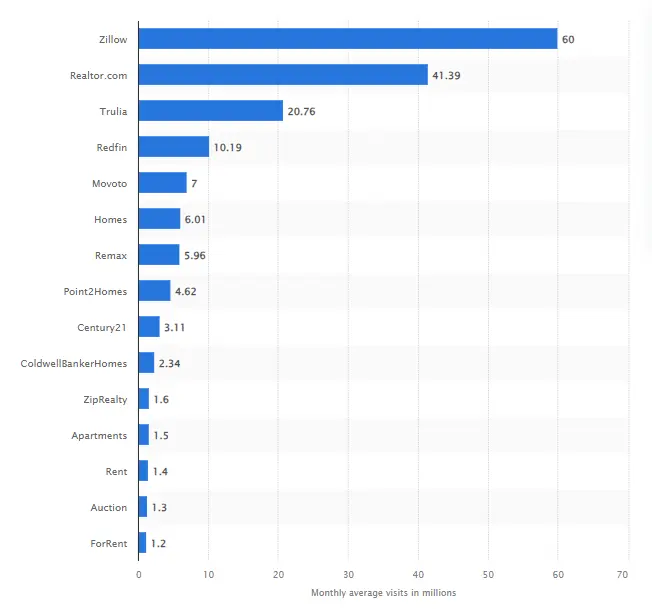
Monthly visits to Zillow are 60 million, which is higher than any other website and is followed by realtor.com and Trulia.
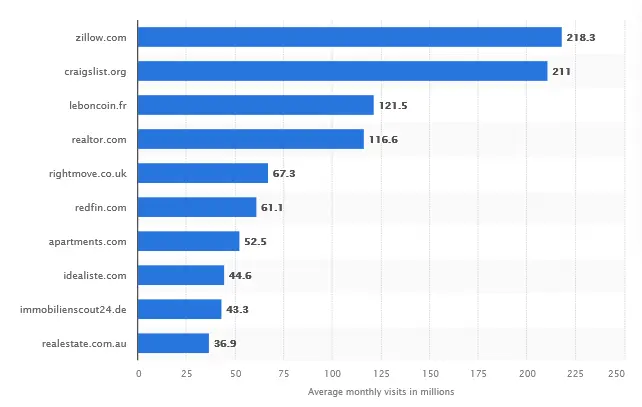
- In the 12 months ending in March 2023, Zillow has been the most-visited real estate website worldwide, with an average of 218.3 million visits per month during the measured period.
- Based on the reports of Yahoo Finance, Zillow has revenue of US $1.95 billion in the year 2023.
- However, Trulia’s revenue per employee is $1,100,000. And its revenue in 2023 was $275 million.
Concept of Real Estate App
Let’s get ahead with the concept of real estate apps.
Real estate apps are software applications that address the needs of various stakeholders like buyers, sellers, property managers, and others. These applications help the user to find and sell properties over one click.
Why Create a Real Estate App?
The market stats and the concept of real estate apps might have helped you to understand the basics. Well, that’s not enough. To identify the right path you need to learn more with this guide on creating a Real Estate App.
The answer to how to create a real estate app can be addressed with the number of steps taken to make an app.
But, before that, let’s make a move to understand why you need a real estate app.
1. Improved User Experience
Prior to digitalization, it was very difficult to find a property with similar interests. Even after covering miles, people are often pissed off to find one property for them. The real estate apps have made it easier. These apps enhance the user experience by providing them with intuitive navigation, high-quality visuals, and interactive property listings.
2. Direct Communication With the Customers
Developing an app can assist you in removing all the brokers and middlemen from between. Direct contact of the user with the brand enhances the company’s image and is helpful in providing better options to the users. It will help you to build strong relations with the users that improve the loyalty of your brand among competitors.
3. To Identify Current Market Expectations
Creating an app can help you to know the actual expectations of the property buyers and sellers. It will help you to draft insights related to property seekers to engage the right audience. After identifying the market expectations you can mitigate the gap between demand and supply of properties with your app.
4. Extend your Reach to Wider Audience
With offline property dealings, you can reach only a limited number of audiences. While after creating an app you can extend your scope to a wider audience. An app contains the ability to go beyond the web page, email, or social media management platform. Along with this, you can have limitless customization options as well as capabilities.
5. Innovation and Technology Integration
You can develop an app by observing the current demand and gap in the real estate market. It will provide you with an area of research that can enable you to create a unique app. Here you can leverage technologies including augmented reality and virtual reality that also offer an immersive property experience.
6. Provides you With a Competitive Edge
An app creation can enable you to get ahead of competitors. It also demonstrates a commitment towards innovation, and customer satisfaction that can keep you up with technological advancement. It enhances differentiation and professionalism by providing the best possible experience to the customers in order to attract users.
Popular Real Estate Apps
Wondering to know the answer of How to develop a real estate app?
Well, you are in the process of learning it via a real estate app development guide. Before identifying the process to make an app, ensure to learn about the observations of the famous apps. This can help you to know your core approach to dealing with realistic competition.
It will help you to explore the gap in the market to make your app unique and diversified. Let’s head to the list of famous real estate apps in the list below.
1] Zillow
Zillow is one of the most downloaded apps for real estate. The company helps people to get their homes with features including task management, lead sorting, and lead assignment.
The app is useful for real estate agents to create free profiles, gather reviews from past clients, and promote their listings. They can have a premium agent to have more features.
You can head to the cost to make an app like Zillow to know the overall cost it takes to make such an app.
2] Realtor
A Realtor is the best app for rentals. They daily update their app listing for free. This process helps the app users to look for the property that they actually demand.
It is a kind of app that earns revenue from advertising. The app contains filters that can assist you in enhancing your property search such as you can add multiple floors, a fireplace, and a community swimming pool.
Another advantage to using this app is it connects the user’s account with their room partner or spouse’s account to help them choose the property together.
3] Trulia
Trulia is best to provide the user with more information about the home values. It provides the users with an experience like a desktop on mobile.
One of the attractive features of the app is that it provides the results of the neighborhoods and society. Such as 89% prefer to have dogs in the society in which the user wants to live and 70% of people in the society prefer to live alone and don’t interfere in others’ lives.
The app provides an extraordinary experience to the app users by listing the local legal protections and helping the app users to know about the legislations in the area to protect them against any gender discrimination or any other offense.
4] Xome Home
Xome makes finding your property simple and realistic. With a real estate experience of more than 10 years, they provide their users with world-class guidance and experience.
Online auctions of property are transparent within the app which helps the sellers and buyers to trust the app and to precede with their property listings without any force or pressure.
The purpose of the company is simple and clear to keep the dream of homeownership alive. Along with this, the inbuilt values of the business can keep users engaged with their services. Here users can find the information about the property by just pointing out the phone camera on it.
5] Redfin
Redfin tries to make the user’s experience with property search easy by using the out-of-the-box business model with their agents and professionals.
The best feature of the app is its tour, where a person can have a tour virtual or in person with the agent of the business. In this app, users can get information based on climate risk data from the First Street Foundation and climate check to get an insight into property risk.
This app also contains the feature to identify the risk of major natural disasters in the particular area, where the user wants to recite. It enables the user all the information about the property scale.
6] Rocket Homes
Rocket Homes allows users to search for homes on the market while preparing for mortgage applications and home purchase procedures.
One of the important features of the app is it helps the users to prepare for the financing procedure. The app includes a free credit-tracking feature that even not impact users’ credit scores.
It assists the users in searching for homes on the map and within their surroundings. They also list the new properties regularly to help their users navigate the app effectively.
Must-Have Features to Make a Real Estate App
You have understood that most of the popular apps target their audience based on their features. Hence, the features and functionalities of the app play an important and infinite role in retaining the targeted audiences.
The section is included in the guide to real estate app development to enable you to decide on features that match your development goal for the app.
Want to know about the idol features that can help your app to succeed? Check out the list below that can assist you in deciding the features you can add to your app.
Users Registration
This is an important feature that can enable the user to register by creating their own account. You should keep the user registration process simple as a complicated procedure can make users confused. Thus, you need to use simple language to keep them engaged.
Authentication Process
Authentication features play a role in ensuring the security of the user’s data. You can add this feature to have an encrypted chat with your direct app user. This feature can work via email or Mobile assisting your end user to navigate the functions within the app.
Property Listings
Create a real estate app that contains property listings for sale or rent that comprises detailed information such as location, size, price, amenities, and photos. Your app should display a list of available homes along with all the important information needed.
Add Filters and Categories
A real estate app with effective filters such as price, search by reviews, location, floors, and number of rooms can help you to attract a large user base. You can make a real estate app that contains all categories such as residential, commercial, and others to make it simple for users to get their properties soon.
Map Integration
Add the map integration within the app to assist the users either sellers or purchaser to get their dream homes via maps. Here users can also list their properties through maps. The feature can help users to view properties on a map and can also perform filter searches based on the locations.
Mortgage Calculator
You can insert a mortgage calculator within your app assisting the users to get an idea about the home loan or commercial loan. It can help them scale up the user’s finances by assisting them to calculate their finances via an in-built mortgage calculator.
Virtual Tours
Develop a real estate app that includes a virtual tour and 3D walkthroughs. Immersive virtual tours can provide users with a realistic sense of the space and layouts without even physically visiting every property. This can save time and money for your app users. You can use AR/VR technology in your app.
Hire an Agent
You can build a real estate app that has an in-built function to hire a real estate agent. You can present a directory of real estate agents and brokers with profiles, reviews, and contact information. This feature can help users to hire agents after checking their profiles.
Social Interaction Feature
Another unique feature you can add is social interaction. Here the new users can contact the existing users of the app and learn about the authenticity of the app’s functions. You can make a real estate app that enables the users to concentrate on the property with account sharing with their relatives or friends.
Notifications and Alerts
You can add this feature to keep your end users informed about the new property list based on their choices and demands. The push notifications and alerts are important to keep the users engaged about upcoming auction events, price changes, or related updates.
Steps to Make a Real Estate App
How to build a real estate app?
After learning the need for app development, important market stats, popular apps, and features. It’s time to have a stepwise guide to real estate app development.
Do you know that to create a real estate app, you need to ensure the right technology along with an accurate app platform?
Yes and much more, you can check on the ultimate Step-by-Step Guide to app development process, below.
Step 1: Market Research
The very first step is to perform market research. Here you need to explore the values and instincts that are related to the market demand and supply options. You need to explore different perspectives of the users who are currently using real estate apps.
Take the user’s feedback that continuously uses such apps as it can help you to plan an application that will be as per users’ needs.
Step 2: Define Your Target Audience
In this step, you need to identify the targeted audience of your app. It will enable you to explore the user behavior and the type of real estate app they actually want.
This will help you to identify the type of app you need to create and the features that can make your app outperform that of the competitors.
Step 3: Plan Your App’s Wireframe
Here you should plan the wireframe. It will ultimately define a clear structure of the app. This will create an outline of the content and can also create a solid foundation for the future steps for designing an app process.
A well-designed wireframe helps in making visualization and interaction design much easier. It can further assist you in identifying layout content functionality over the app.
Step 4: Decide on to the App’s Design
Now, it’s time to decide and plan the app’s design. Here you will select the right UI/UX design that can enable you to increase the user experience with the font, color, and theme.
An attractive design can even enhance your app’s loyal customer base. Here you need to check the UX design principles before planning the design of your app.
Step 5: Select a Right Tech Stack
In this phase, you should decide on the tech stack that you want to have in your app. Here you should decide on the language, database, and APIs.
The platform helps to identify the kind of application that you want to make along decide the customization level. Here you can hire mobile app developers to help you decide on the right tech stack.
Step 6: Define the key functions and features
Once you have a clear idea about the tech stack and app’s design, now you should decide the functions and app features. You need to create a list of all the essential features of your app
Before deciding on the features, always remember to consider the diverse range of users who can use the app, so that everyone can find it useful. You should update the features of the app according to the changing user’s demands.
Step 7: Select the Suitable App Platform
It’s time for you to decide on the particular platforms on which your app should work. You should identify the target market and need to evaluate the platform’s market share.
Here, you should consider the resources with you, and selecting both the platforms (iOS and Android) for your app can cost you huge. You can hire iOS app developers or Android app developers in this case.
Step 8: Testing of App
When the app gets ready to launch, you should test your app on real users. It will help you to identify the bugs and errors that can impact your app functionality later.
Testing and quality checks can assist you in removing all such issues that can increase your app’s functions and protect your app from any future app bugs. This process is useful to detect security vulnerabilities and support continuous improvement.
Step 9: Launch and Deployment
In this stage, you will launch your app on the decided app platforms. You should read all the regulations of app launch carefully on multiple platforms before you decide to launch the app.
Set the launch date, you can market the launch date of your app to attract users and early adopters. Coordinate with the team partners to ensure everything is in place prior to launch. Here you should also optimize the app store listings, titles, and keywords.
Step 10: Maintenance and Support
Now, it’s time to keep your app maintained. It is an ongoing process and you need to keep your app updated by ensuring it has sufficient support from your app maintenance team. App maintenance is important for your app’s survival.
You can have a mobile app maintenance checklist to support your app’s presence in the competitive market. The time of app maintenance depends on the type of app and technology used in the app.
Common Mistakes to Avoid While Making a Real Estate App
Initiating a start-up or a process is never easy. Risk is uncertain and they never end up with a well-established approach. Hence, you should be aware of the mistakes that are needed to avoid while developing a real estate app.
Go through the list below to learn about the risks that can impact your plan to make a real estate app.
Avoiding Research
Research is a prominent part of building a real estate app. If you avoid it, you do not get to know enough about the current market and your users’ actual demand. An app that does not address current users’ demands will automatically fail.
Scope Creep
Ignoring the aim of the app can make you lose the users. Changing the app’s functions again and again can result in high costs. Thus, avoid scope creep errors by making your aim of social media app creation simple and clear.
Failed to Select the Right Technology
You must opt for the right technology for developing your app. There are several diverse technologies available. Yet selecting the most appropriate tech can make your app outperform your competitors. Thus, choose the technology wisely.
Lack of Testing
Poor testing and quality checks can impact your overall app’s performance. Hence to save your app’s presence in the market, you should always test it before launch. It will always help you to get the right user base by avoiding bugs at a prior stage.
Ignoring App Maintenance
If you ignore the app maintenance, you will end up retaining the loyal users. This issue represents the importance of app maintenance in your app creation process. Hire a mobile app maintenance company that can help you with app updates and support.
Ineffective App Design
Poor app design is an essential process that can affect the user interface and their behavior in selecting an app for a long-term purpose. An easy navigation within the app can help user to fulfill their needs with the app. Hence planning a user design is crucial.
Cost to Develop a Real Estate App
To develop a real estate app, it is vital that you know well about the cost to make an app.
The overall cost range to make a real estate app is $15,000 to $95,000. However, this cost is impacted by certain factors. Let’s study them in the following section.
Factors Affecting the Cost to Make Real Estate App
Till now, you have gone through a list of popular apps needed to develop an app, stepwise process, and a lot more within a complete guide to real estate app development.
Now, are you eager to identify how much you should invest to make your app reach your target audience?
Well, it all depends on the features that you want in your app. The costs range within an app changes as you add complex features and want to have the latest technology. Such as the use of AR or VR in your app. Here is a list of factors that can impact the overall cost of your app.
► Complexity
A high complexity can cost high. Thus, you should decide on the complexity of the features before investing in it.
► App Design
You should decide on the app design as an easy navigation interface with all the features that can increase the user experience.
► Platform Compatibility
If you keep your app available for iOS and Android, it will cost more. On the other hand, selecting a single platform for app launch can impact the cost of investment in an app.
► Tech Stack
Technology needs investment. Hence, you should be aware of the right tech to make your app efficient to meet users’ demands. Invest in the right technology for app survival.
► Development Team
Two significant parameters are required to consider under deciding the cost of a development team. These include the location and expertise of a development team. Select the team wisely.
Tips to Make Your Real Estate App Competitive
Proceeding towards the end of a comprehensive guide to real estate app development, let’s provide you with some additional tips that can add to your knowledge of how to make a real estate app. It can provide your app a competitive edge.
Choose the right tip or you can select them all to lead the real estate world.
1. User-Centric Design
You should design the app that your target user exactly wants to have. It can assist you in prioritizing the user experience to keep users engaged and satisfied. This strategy can keep your users engaged.
2. Search Filters
The app design should be developed in order to enable search filters. Add advanced search filters that can increase user search and make your users aware of the current searches that other users make. It can help them to know about the property search better.
3. Add Chat Solution
You can add a chat solution for your app users that can enable them to interact directly with the user. Instant communication is an important factor that can resolve your users’ queries before they change their real estate app preferences.
4. Administrative Panel
The app should contain an administrative panel. It should be included in the minimum viable product (MVP) of the panel. Here, the panel should be authorized to decide who can submit, manage, or remove the properties from the listings.
5. Personalization and Recommendations
You should use this feature within the app to utilize data-driven insights to offer personalized property recommendations. It should be completely based on the user’s behavior, preferences, and search history.
6. Secure Transactions
It is an important feature and you can have it by hiring an experienced mobile app development company. They can assist you in creating a secure transaction to facilitate a seamless customer experience. You should add multiple payment gateways to make the transaction process smooth.
Why Choose Nimble AppGenie to Make a Real Estate App?
With a complete guide to real estate app development, you have it all that a real estate app should cover. Here, you should be well aware of selecting the right team that can support your investment in the app.
Nimble AppGenie can help you in this journey. We are the best real estate app development company with a certified team of experts.
We will make every possible step needed to make your app win among competitors. Let’s do it together.
Conclusion
The modern real estate landscape demands innovative solutions to meet the evolving needs of buyers, sellers, and agents. By implementing user-centric design, comprehensive property listings, advanced search options, interactive features, and secure transaction capabilities; your app can address the demands of app users.
Through personalized recommendations, virtual tours, and seamless communication channels, you should ensure a streamlined user experience that fosters engagement and satisfaction. Integration with MLS databases, real-time notifications, and continuous updates further enhance the app’s functionality and relevance in the market.
With a commitment to meeting client expectations and staying ahead of industry trends, you can offer a comprehensive solution to empower real estate agents and needs of your users.
FAQs
Developing a real estate app can revolutionize your business by providing improved user experiences, direct communication with customers, insights into market expectations, extended reach to a wider audience, integration of innovative technologies, and a competitive edge over competitors.
Popular real estate apps attract users by offering comprehensive property listings, advanced search filters, interactive maps, virtual tours, direct communication with agents, neighborhood information, and personalized recommendations.
Essential features for a real estate app include user registration, authentication, and property listings with filters, map integration, mortgage calculator, virtual tours, and agent hiring functionality, social interaction features, and notifications/alerts.
The steps include market research, defining target audience, planning wireframes and design, selecting tech stack, defining key functions and features, choosing suitable app platform, testing, launching, and ongoing maintenance and support.
The cost depends on factors like complexity, app design, platform compatibility, tech stack, and development team expertise. On average, the cost ranges from $15,000 to $95,000.
To make your app competitive, focus on user-centric design, search filters, chat solutions for direct communication, administrative panels, personalized recommendations, and secure transactions.

Niketan Sharma is the CTO of Nimble AppGenie, a prominent website and mobile app development company in the USA that is delivering excellence with a commitment to boosting business growth & maximizing customer satisfaction. He is a highly motivated individual who helps SMEs and startups grow in this dynamic market with the latest technology and innovation.
Table of Contents




![CTA_1_Ready_to_revolutionize_your_real_estate_business[1]](https://www.nimbleappgenie.com/blogs/wp-content/uploads/2024/04/CTA_1_Ready_to_revolutionize_your_real_estate_business1.webp)
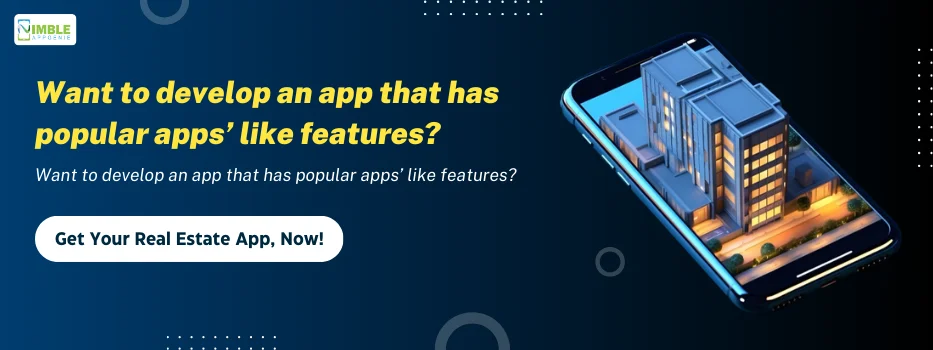
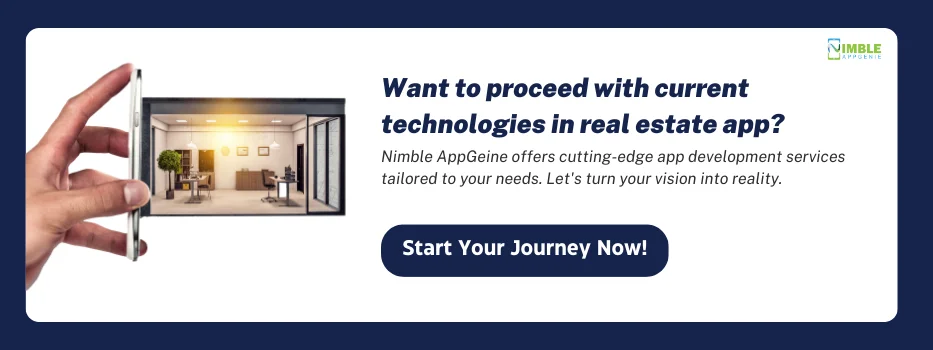
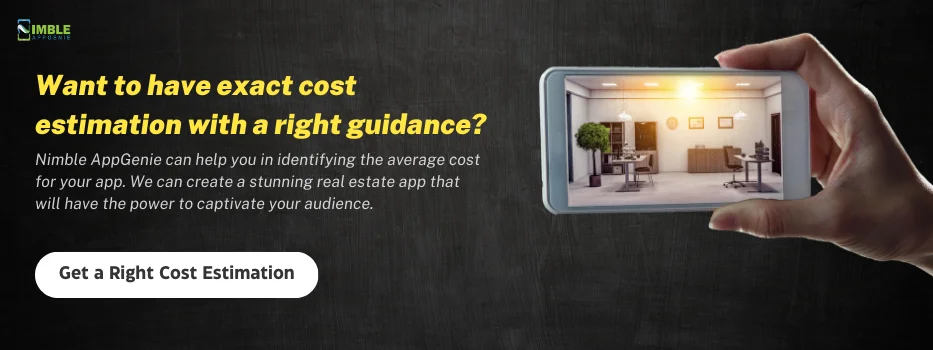








No Comments
Comments are closed.